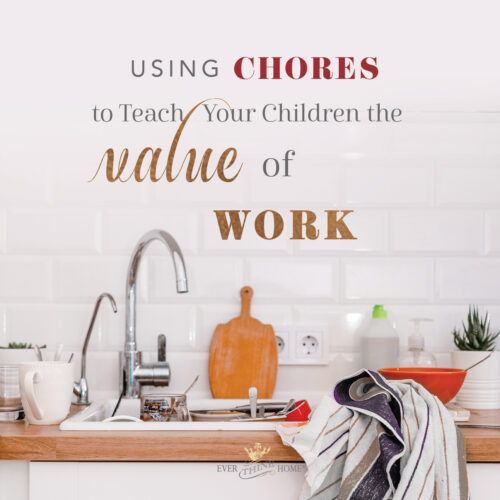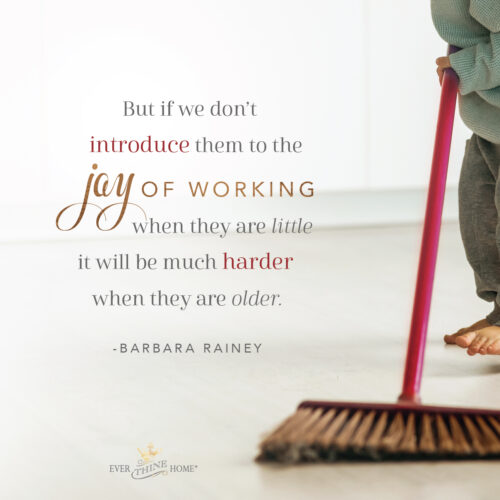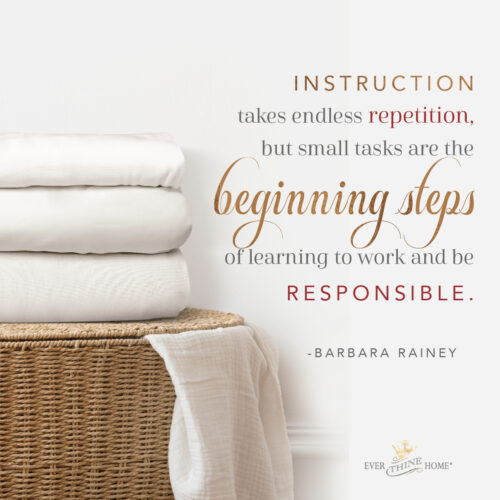
Early in our marriage, Dennis and I discovered we had very different views on the value of work. Then we had children … and the conversation widened to include questions like, “How do we balance play time and teaching time? How much can we expect of our toddlers, our preschoolers?”
Do you know what values motivate you? In those early parenting years Dennis and I made individual lists of what values mattered to each of us, what values we wanted to teach our children. Then we combined these into a single list we titled “What we want to teach our children.”
It wasn’t a simple or a quick conversation! As I wrote in my book, Letters to My Daughters, “Different ingredients don’t blend easily.” Over the years we modified the list as we remembered qualities or learned a truth from the Bible that we had to include. You can find that list here.
One of my contributions to our list was teaching our kids to value work as good. God put us in His creation to work with it, manage it, and steward it. All occupations that are needed in our world … from tech jobs to driving semi-trucks, to service jobs, parenting, ministry work, selling insurance or other products that make our lives better … all this work is good and can be a daily offering to God as we labor for His glory.
Our children worked from the time they were little. They loved helping me when they were old enough to carry things for mommy. Of course they made messes and it would have been easier if I had just completed these chores myself. But if we don’t introduce them to the joy of working when they are little it will be much harder when they are older. It’s not so hard to be an adult if you learn it slowly over the first 18 years of life.

Work is a holy calling. God declared in the Garden of Eden that Adam and Eve were to work for six days and rest on the seventh. And work isn’t optional either.
Here are some of the jobs our kids did and the ages when they began.
1. At age three they began to run little errands for me. Get mommy a diaper for the baby … take a pile of clothes (a manageable one for their size) to a sister’s room. I also gave them small jobs like emptying the silverware holder from the dishwasher into the drawer. It’s a great “matching things” exercise. And I let them carefully move eggs from the carton to the container for the refrigerator.
My daughter, Rebecca, who went to culinary school, began teaching her twins to cut and chop foods at age three with child-safe knives.

2. At age four or five they began to pick up their toys, clean their room and put on their own clothes.None of this is easy. Instruction takes endless repetition, but these small tasks are the beginning steps of learning to work and be responsible.
3. In early to upper elementary age, our kids began to do regular chores.Emptying the dishwasher, carrying folded laundry or grocery sacks from the car, making their beds, feeding the animals, etc.
I made charts for years to help them see their progress and earn rewards. They learned to do things like rake leaves, help Dad with the mowing, wash and dry dishes, load the dishwasher, help with baby sister by reading her a book or getting her some toys. And any work I did around the house included teaching my children to do it, knowing one day they would be adults whose lives would include all of this kind of work. (See printable chore charts at the end of this post.)
Get your copy of The Art of Parenting here!
4. At age 14 we increased our kids’ allowances so they could begin to budget and learn to buy their own clothes. We had many interesting conversations as personal preferences came out. Like the time our son decided he wanted the hottest new tennis shoes. It was more than his entire monthly allowance, but he saved and bought them two months later. But it meant no new anything else.
5. At 12-14, we also gave them the responsibility of doing all their own laundry. After paying for a brand-new pair of expensive jeans with their own cash, they were much more careful when washing them!
Their personal tastes also made them realize they needed extra income. This motivated them to get jobs babysitting or mowing lawns. I remember Dennis telling our teens, “You are becoming an adult and we are not responsible to satisfy your adult tastes.” Learning to stretch their dollars was valuable training for their futures.
6. Then we let them work for others. It’s important to learn how to answer to a boss. One of our sons worked at 16 for a small construction company and learned to do roofing in the hot southern sun. It was the summer he became a man.
Most of my kids are teaching their own kids to work too. And they’ve lowered the age level for some of these jobs, like laundry! I say, “Way to go!”
May you bravely raise up your children to be hard workers who are dependable and responsible. Life will be easier for them if you do.
Printable Chore Chart (for boys)
Printable Chore Chart (for girls)
You might also want to read, “50 Character Qualities We Hoped to Teach Our Children.”





